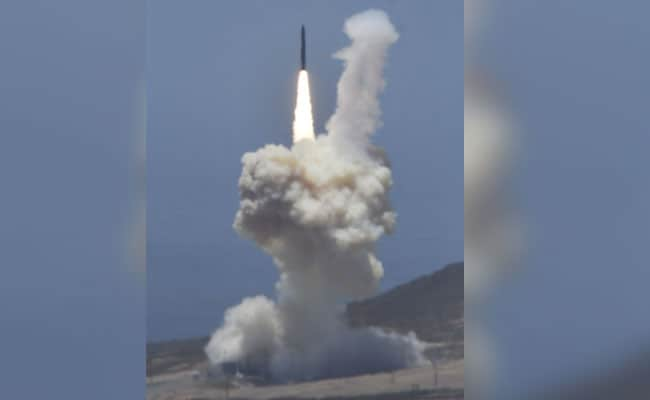With Eyes On North Korea, US Successfully Destroys Mock ICBM Over Pacific
A ground based interceptor missile take off at Vandenberg Air Force base, California.
The ground-based mid-course defense (GMD) system used a five-foot "kill vehicle" released from a larger ground-based interceptor missile to obliterate the mock ICBM, defense officials said.
The U.S. military destroyed a mock intercontinental ballistic missile thousands of miles over the Pacific for the first time Tuesday, a step forward for a missile-defense program that has taken on new significance in light of North Korean threats.
The ground-based mid-course defense (GMD) system used a five-foot "kill vehicle" released from a larger ground-based interceptor missile to obliterate the mock ICBM, defense officials said. The mock threat was launched from the Ronald Reagan Ballistic Missile Defense Test Site in the Marshall Islands, and met by an interceptor launched from a silo at Vandenberg Air Force Base in California.
"The intercept of a complex, threat-representative ICBM target is an incredible accomplishment for the GMD system and a critical milestone for this program," Navy Vice Adm. Jim Syring, director of the Missile Defense Agency, said in a statement. "This system is vitally important to the defense of our homeland, and this test demonstrates that we have a capable, credible deterrent against a very real threat."
The test was once scheduled for last year, but pushed back as the Missile Defense Agency made engineering changes to the interceptor, according to a report from the Government Accountability Office released Tuesday. The problems prompted the Pentagon's top weapons tester, the Directorate of Operational Test and Evaluation, to assess last year that the ground-based mid-course system had demonstrated only limited ability to defend the country in part due to its low reliability.
Navy Capt. Jeff Davis, a Pentagon spokesman, said before the test Tuesday morning that its timing is not tied directly to recent tensions with North Korea, which include Pyongyang continuing to carry out nuclear and ballistic missile tests and threatening to attack both U.S. bases abroad and the continental United States.
But "in a more broad sense," Davis said, "North Korea is obviously one of the reasons why we have this capability."
Davis played down the need for a successful test ahead of time.
"We improve and learn from each test, regardless of the outcome," he said. "That's the reasons we conduct them."
The test was led by the Missile Defense Agency, and also included the Air Force's 30th Space Wing at Vandenberg and U.S. Northern Command, which oversees the defense of the United States at home.
The Pentagon declared the missile-defense system ready for combat in 2004, but its testing history has been mixed. Four of nine missile intercept test attempts prior to Tuesday had been a success, including the last one in June 2014.
In April, Navy Adm. Harry Harris, the chief of Pacific Command, told the House Armed Services Committee in April that North Korea is "clearly in a position to threaten Hawaii today" with a ballistic missile attack, and that the Pentagon should consider adding new ballistic missile interceptors and defensive radar there as a result.
"I believe that our ballistic missile architecture is sufficient to protect Hawaii today, but it can be overwhelmed," Harris said at the time. If the United States faced a wave of incoming ballistic missiles, he added, "someone would have to make a decision on which one to take out or not. So that's a difficult decision."
(Source : ndtv.com)




Post A Comment
No comments :